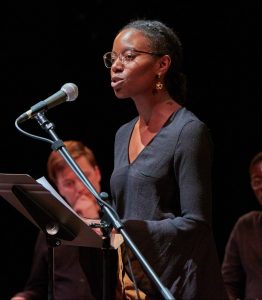Nia read Rosaleen Bertolino’s “The Doll Family” on November 10, as part of an NER Out Loud event at Middlebury College. “Doll Family” was originally published in NER Vol. 38, No. 3 (2017) and is available to read online here.
 Nia Robinson ’19 is a junior Sociology major from Chicago. Over the past almost two and a half years, she has served as co-president of the Black Student Union, an opinions editorial board member, AFC student intern and fellow, member of Poor Form Poetry, volunteer at Mary Hogan Elementary School, and loyal viewer of Vermont’s sunsets. When she isn’t speaking, you can usually find her at Crossroads, writing poems or just trying to figure it out. This will be her second time performing in NER Out Loud.
Nia Robinson ’19 is a junior Sociology major from Chicago. Over the past almost two and a half years, she has served as co-president of the Black Student Union, an opinions editorial board member, AFC student intern and fellow, member of Poor Form Poetry, volunteer at Mary Hogan Elementary School, and loyal viewer of Vermont’s sunsets. When she isn’t speaking, you can usually find her at Crossroads, writing poems or just trying to figure it out. This will be her second time performing in NER Out Loud.
ABOUT THE AUTHOR
Rosaleen Bertolino was born and raised in the Bay Area, where she worked as an office manager for her husband’s electrical business, and she now lives in Mexico. She is co-author of the book The Wandering Mother, and her stories have appeared in the Capra Review, Gravel, Euphony, West Marin Review, and many others. Among her awards are a Marin Arts Council individual artist grant and honorable mention for the James D. Phelan Award.